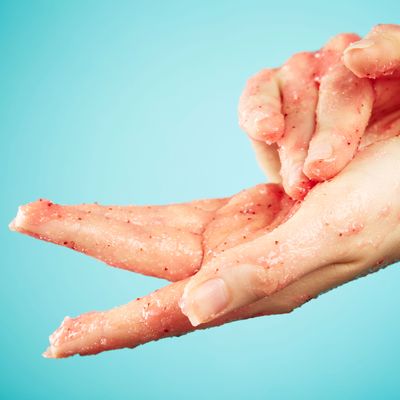
The text came in from a worried friend one night: “I think I might have broken my moisture barrier!” After making sure she was okay (“Did it hurt? Was it your first time? How do you feel?”), I asked what the hell she was talking about. My friend was worried that she had over-exfoliated and ruined her skin for good.
Exfoliation is the skin-care equivalent of a high-intensity sport. Sure, moisturizing is nice, but moisturizing your face is like a leisurely walk in the park. In contrast, exfoliation feels like work; it’s sweat equity in an effort to get great skin, and as your face gets softer, you can see the results in real time.
Perhaps that’s why, as with exercise, it’s easy to go overboard. There’s no evidence that shows that endorphins are released once you’ve finished slapping Good Genes all over your face. But there’s definitely something satisfying about the tingle you get with some exfoliating toners. “I love drama and I’m impatient, so I like to try a bunch of products and usually use them all at once. For a little while, I’d use two chemical exfoliants morning and night. Absolute madness,” says writer and exfoliator lover Hunter Harris.
Celebrity esthetician Renee Rouleau sees the appeal. “You get immediate gratification with acids and exfoliation. It works fast. It makes the skin feel softer, dries up breakouts, and people love the quick hit you get with it, as opposed to retinol.”
Ask any dermatologist, and they’ll tell you that exfoliation, like using sunscreen and moisturizing, is one of the tenets of a proper skin-care routine, no matter your skin type. But although dermatologists agree that you should exfoliate if you want brighter, clear skin, they differ on how often you should do it (Beyoncé’s dermatologist, Dr. Lancer, suggests you do it every day), and whether you should use physical or chemical exfoliant.
Many would say, though, that as interest in skin care continues to grow, over-exfoliation is becoming a bigger issue. “Since the ’80s, people have always been over-exfoliating. We live in a society where people think more is always better , but that’s not necessarily true,” dermatologist Dr. Paul Jarrod Frank says, philosophically. Rouleau agrees that the issue has “had a real resurgence.”
And Vicky Tsai, founder of Tatcha, adds, “We often hear from clients who say they have sensitive skin. They have often over-exfoliated the skin, chemically or physically, which is very punishing and causes inflammation.”
Much like overdoing anything, over-exfoliation causes harm to the skin. In layman’s terms, Tsai explains that the harm results from “taking off more of your skin than is ready to come off.” Experts agree that if your skin feels constantly raw, red, or very sensitive to the touch, or it burns whenever you put any product on it, it’s most likely over-exfoliated. (Note that while exfoliation does help with cell turnover, experts consider it to be different from retinoid. Retinoids encourage cell turnover by doing it within the skin; it’s not a manual process).
The outermost layer of your skin is known as the epidermis. It contains the moisture barrier, also known as the acid mantle. Despite the name, the acid mantle is not a psychedelic cloak. Your skin is naturally acidic, with a pH hovering in the five-ish range. A healthy acid mantle, explains Dr. Lancer, acts like a filter (a window screen kind of filter, not a Valencia kind of filter), allowing certain things to enter the skin and keeping out others. Things you want it to allow in: Pricey serums. Things you don’t want it to allow in: Anything you encounter during your commute.
When your acid mantle is compromised, you can get invisible cracks or micro-tears in the skin and mantle. If it’s really bad, you can even see the tears. Dr. Lancer says it looks like chapped lips. As you might expect, having a compromised skin filter is troubling. “Moisture escapes and irritants get in easier. Products that normally wouldn’t be irritating do irritate,” says Dr. Frank.
But don’t worry — it’s actually very easy to repair damage from over-exfoliation. Just stop. Stop doing it so much. Exfoliation affects only the dead skin cells on top of your skin. “It doesn’t make a difference on the active living portion of your skin,” assures Dr. Frank. “There’s no proof that over-exfoliating messes up your skin for the future. It messes it up only for the time you’re messing it up.” (Something which does permanently affect your acid mantle: Sun exposure.)
All the experts agree that your skin is incredibly resilient and great at healing itself (provided you don’t have other extenuating circumstances, like an auto-immune disease). The second you get a cut, your body goes into repair mode. If there’s any trauma from exfoliation, it will do the same. “If you think of exfoliation as a form of wounding, within seconds a rescue party comes out and minutes later the remodeling of the wound starts and days later new soldiers come out to modify the injury,” analogizes Dr. Lancer.
So how much should you exfoliate? “There is no perfect amount,” says Dr. Frank. Unhelpful, you might be thinking. But he explains that less is more. If you’re young and have good skin, you are a unicorn and also presumably don’t need much exfoliation. But if you notice acne, dry skin, or dullness, there might be more room to exfoliate more. If that guideline doesn’t help you, Rouleau suggests doing it no more than five times a week.


